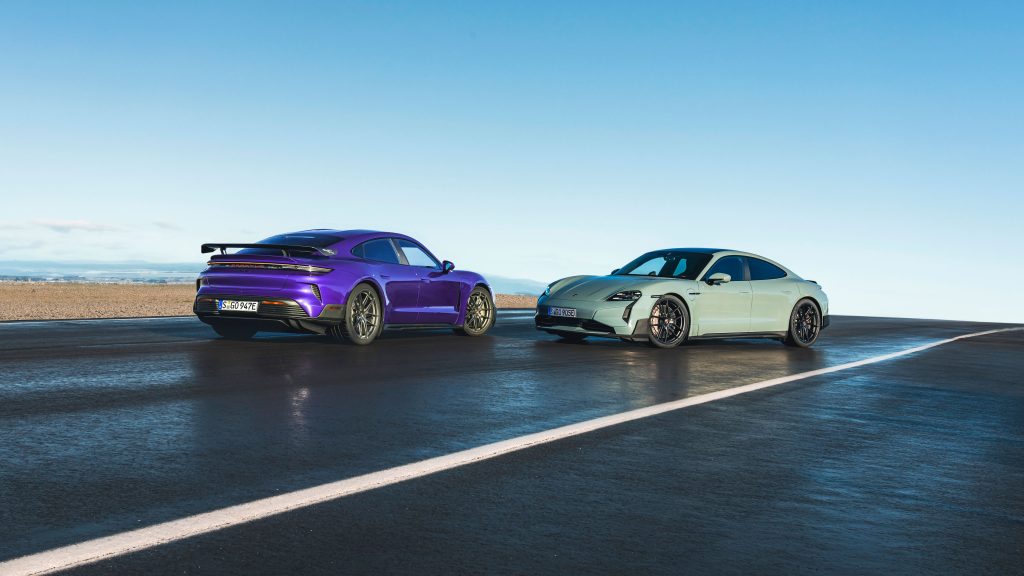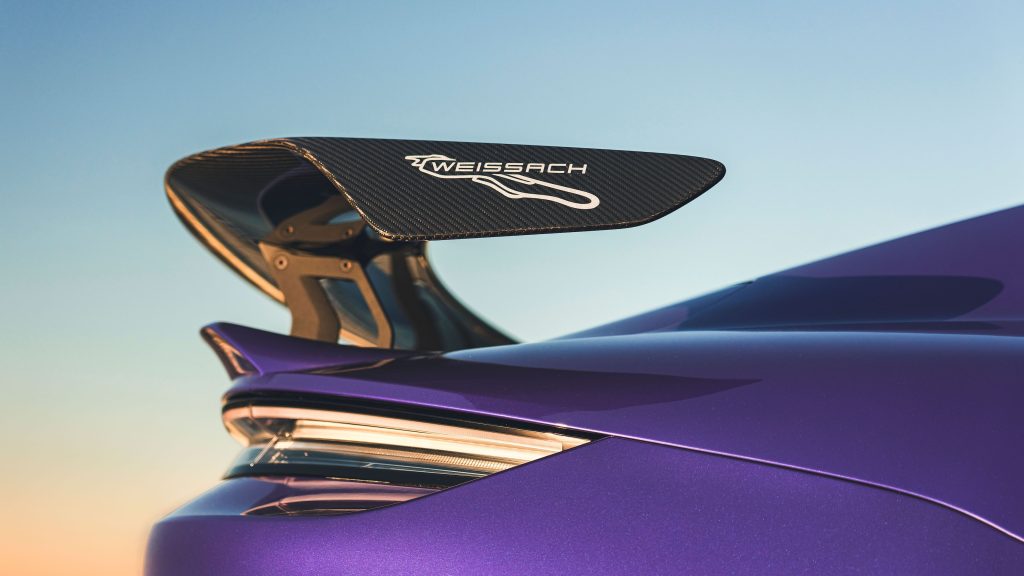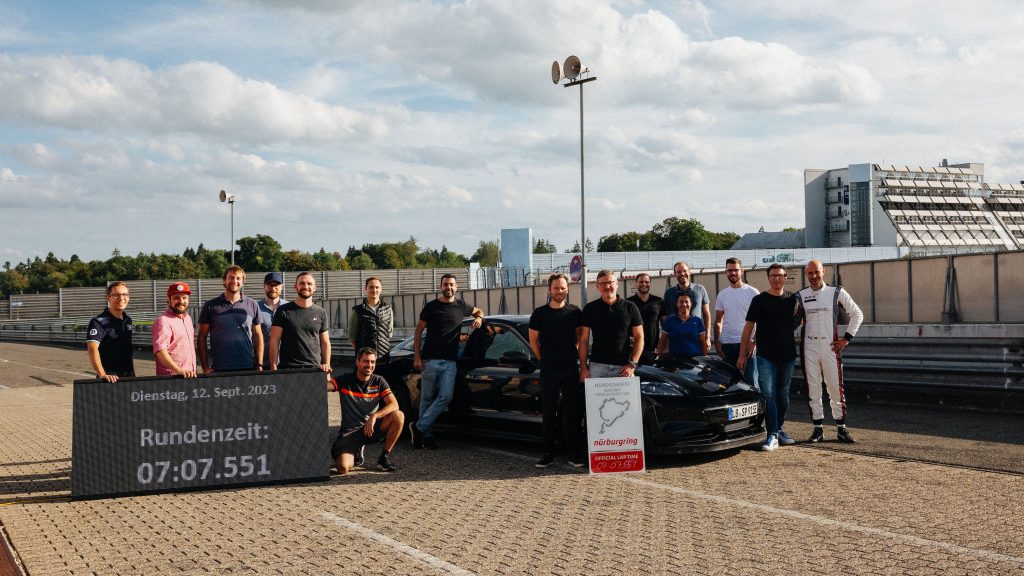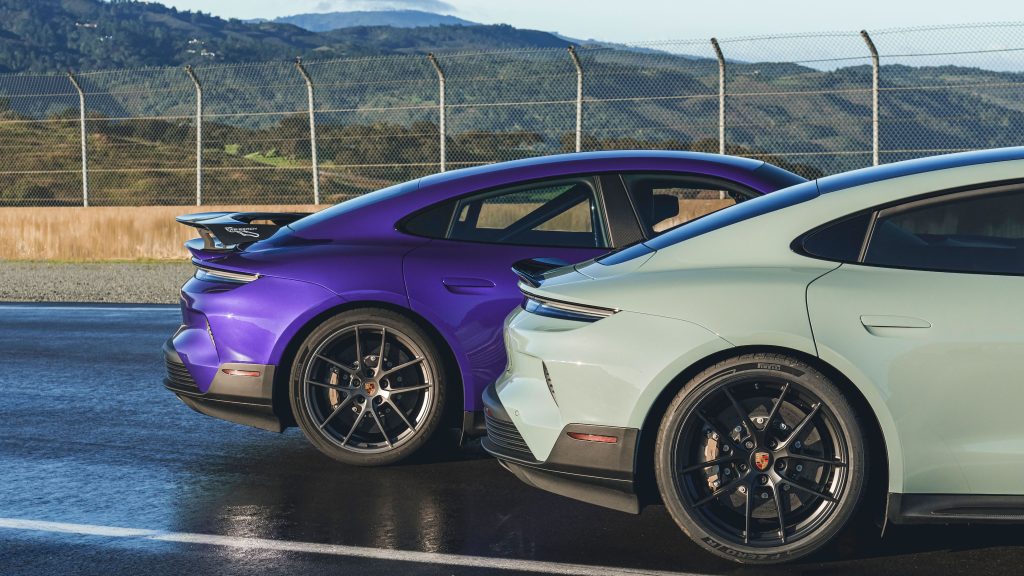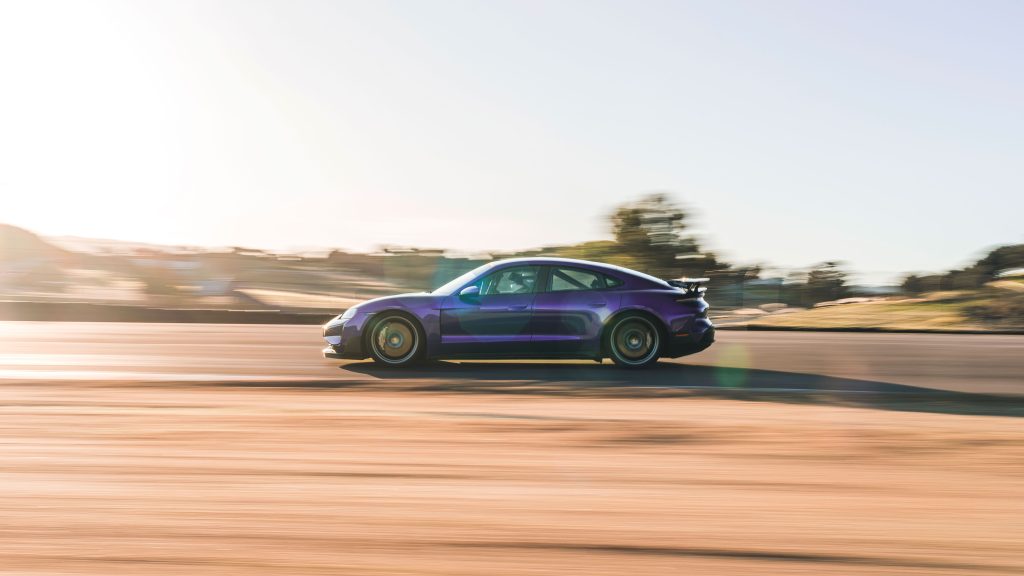
[ad_1]
A Trailblazing Take on GT-grade EV Performance
While it’d be an extremely nuanced claim that the Porsche Taycan has been gracefully received by the community at large—from both a spiritual and commercial standpoint—there’s no doubt that when looked at in isolation, the Porsche Taycan has always been a remarkable product of high-echelon car manufacturing.
Whether you like it or not, EVs are going to be a big part of the equation going forward, though I’ll be the first to insist that it’s not looking like they’ll reach “be-all-end-all” status anytime soon, if ever. Yet, we have to be prepared for them. Afterall, they’re already here and by golly, is Porsche ever pulling out all the stops to show us the way (and that there can indeed be one) when it comes to all-electric sports cars.
They’ve been proving that since day zero of the platform’s existence, and while today’s announcement might be the proverbial cherry-on-top, the rest of the sundae was already tasting mighty fine. The first iteration of the 2019 Porsche Taycan Turbo S remains both relevant and impressive to this day, but Porsche has continued to improve the car through the past 5 years, by increasing performance, adding new features, and introducing additional body-styles like the more rugged and utilitarian Taycan Cross Turismo.
Yet, as comprehensive as the line-up was before today, there was always that niggling feeling that something was missing. While the contemporary Taycan Turbo S can sprint from 0-100 km/h in just 2.4 seconds—already hypercar levels of performance by that measure—we had yet to experience a Porsche Taycan which was conceived in the same mold as the company’s motorsport-inspired GT road cars. Namely, the GT2, GT3, GT4, and all manner of RS variants.
Now, that’s all changed.
Porsche Taycan Turbo GT
Even though the latest Taycan to be unveiled uses nomenclature which was previously exclusive to the range-topping Cayenne SUV—a high-performance car in its own right—the new Porsche Taycan Turbo GT has much more in common with the aforementioned line of GT models. Those cars, as most of us are acutely aware of, are an intricate balance of power and chassis philosophies which ultimately produce a car that is as engaging to drive as it is dominant at the race track.
Corkscrew Cred
It’s true that there is a hierarchy which exists when it comes to lap times and outright performance credentials between each of the series, and you’d expect the only EV out of the lot to play second fiddle to the more conventionally inspirational petrol-powered cars. The Porsche Taycan Turbo GT says “hold my beer” to that, clocking a blistering 1:27.87 at the world-renowned Laguna Seca Raceway.
Officially, this means that Taycan TGT is now the fastest EV production car to lap the quintessential California race track after achieving the same feat at the Nürburgring Nordschleife not long before in pre-production form. In terms of bragging rights, that’s another big “W” versus the Taycan’s fiercest and most direct competitor—the Tesla Model S Plaid—which it has now dethroned at those two tracks, with more to follow I’m sure.
While there’ve been no official attempts at lap times at Laguna Seca (using a factory driver, et al) with other current Porsche GTs such as the GT3 RS and GT4 RS, existing data on YouTube and online forums suggest that the Taycan Turbo GT could possibly even be the fastest Porsche of them all, at this circuit. There’s evidence that the latest 992 GT3 RS is already good for pulling off consistent 1:28s, while the new 718 GT4 RS is just a couple seconds behind. Keep in mind that there are of course many variables at play here, not least of which is the fact that Lars Kern wasn’t behind the wheel of either of those two cars—so take that as you will.
Insane Benchmarks
There’s no reason to believe that the Porsche Taycan Turbo GT won’t come through as the lightest version of the Taycan available today, but there has still got to be a serious powertrain when it comes to lugging around almost 5,000 lbs that quickly around a racetrack. Well, that’s what the Taycan TGT has in spades, with up to 1,019 hp and 988 lb-ft of torque available to slingshot it through the apexes. This is sent through an all-wheel drive system which utilizes a dual motor setup and a 1-speed and 2-speed transmission on the front and rear axle, respectively.
New “Attack” Mode
This has to be one of my favorite new features. If you’ve already watched the video above, you’d probably have noticed paddle “shifters” mounted on the steering wheel. Your eyes did not deceive you, but you may have been wondering what function those would be serving in an EV. Porsche says that the paddles control two things—the left would be to toggle your regenerative braking settings, and the right is for activating this new Attack Mode.
What the latter action will do is trigger up to an additional 120 kW of power for 10 seconds, which is functionally similar to the push-to-pass feature on other Taycan models, though Porsche says that Attack Mode is intended only for use at the racetrack (wink, wink, right?). This unlocks the full 1,019 hp that the car is capable of producing, and is also a requisite action sequence in activating Launch Control, from which 0-60 mph is attainable in as little as 2.1 seconds.
Weissach Package (For Real)
If you needed any more convincing that the Turbo GT is very much the ilk of Porsche’s other GT-series cars, then perhaps the available Weissach Package will finally sway you. It’s available for the very first time on a Porsche Taycan model, and has traditionally been an option reserved for the likes of the GT2 RS, GT3 RS, and more recently, the GT4 RS. I think that speaks volumes both on how Porsche themselves perceive the car, and how (seriously) they want their customers to take it.
Weight reduction remains very much the name of the game when it comes to the WP, with over 70 kg lopped off the “regular” TGT thanks to a generous serving of carbon fiber bits. There’s a more “spartan” philosophy with the WP as well, which deletes the rear seats, the Bose Surround Sound system and even one of the charge port doors—with the remaining one needing to be operated manually instead of electrically—all in the name of saving weight.
Another key feature of the WP is the fixed carbon rear wing which adds up to 220 kg of downforce—the non-WP cars come with an adaptive rear deck spoiler, providing a more streamlined silhouette for customers who prefer its subtlety. Porsche claims that the WP also shaves off a tenth of a second from the 0-60 mph launch and improves top speed to 305 km/h. Perhaps most interesting of all, is the fact that it’s also no cost option for the Porsche Taycan Turbo GT, so you can make your pick without any reservations. One for the track, or one for the street—which one will you choose?
Obligatory Track Goodies
Porsche Ceramic Composite Brakes (PCCB) come standard on all Taycan Turbo GT models and have been optimized for use on the EV platform. There’s also a specially tuned Porsche Active Ride suspension managing the car’s handling, and standard lightweight carbon bucket seats keeping the driver and front passenger tightly secured during those inevitable (and hopefully abundant) high g-force-producing moments. The presence of Race-Tex really hits home the GT-ness of this car, with those who also opt for the Weissach Package being treated to its exclusive logos and embroideries.
Charging & Range Improvements
The new Porsche Taycan Turbo GT is the beneficiary of the model range’s recent improvements in these areas, with a charging output of up to 320 kW now available for the 800-volt system. This means that the TGT can replenish a 10% SoC to 80% in as fast as 22 minutes and has an estimated range of 555 km—quite an improvement over the EPA-rated range of 201 miles (309 km) for the original Turbo S, back in the day.
While I have my doubts that anyone in the market for a Turbo GT will be overly concerned with range, these details could still end up being significant in the context of driving one at the racetrack, where charging speeds and battery range will play a key role in determining how much you can enjoy your time there.
Pricing & Availability
Both the Taycan Turbo GT and Taycan Turbo GT w/ Weissach Package start at an MSRP of $230,000 USD. They are available exclusively in sedan configuration—no word yet on whether there will be a Sport Turismo variant. First deliveries are expected to arrive state-side by the summer of 2024.
Image Gallery
Video Gallery
[ad_2]
